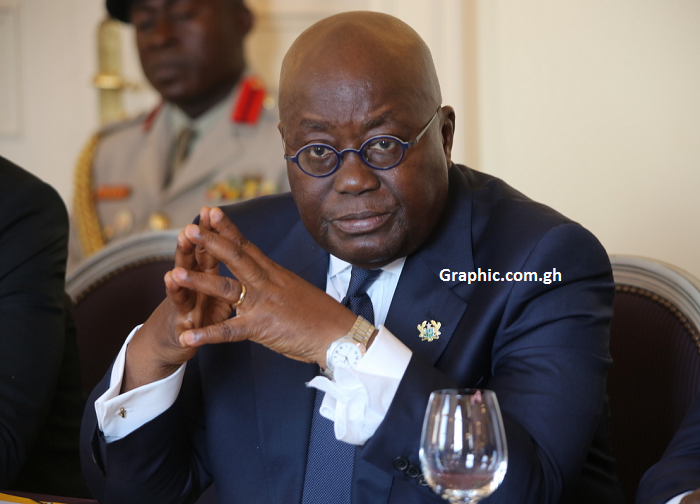
Akufo-Addo must actualise Ghana’s nuclear dream
After decades of stop-start journeys to nuclear, Egypt last month announced that it had sealed a $700 million deal with USA-based General Electric (GE) to supply turbine and generator units for the country’s maiden Nuclear Power Plant (NPP).
Advertisement
Like Ghana, that country’s civilian nuclear programme suffered a tortuous journey until around 2012 when it was meaningfully revived and now being guided towards fruition.
By that, Egypt has successfully shaken off the monstrous lack of political will around nuclear programmes in Africa and is now on its way to generating 1,200 megawatts of electricity from the resource in 2026. It aims to quadruple the figure to 4,800MW by 2029.
The country’s momentous
To sustain the economic growth and feed the nation, the country requires sustainable and affordable energy. That is where nuclear energy (with its enchanting benefits listed below) came in handy.
The USA-based GE said in a statement that Egypt’s maiden nuclear plant, the El Dabaa will provide electricity for four million people, equivalent to the population of Accra.
Elsewhere, Zambia, Kenya
How we’ve fared
Here in
After the nuclear dream was rejuvenated in 2006, thanks to the debilitating energy crisis at the time, it was again abandoned until 2013
Since then, however, the momentum has been sustained, with intergovernmental agreements now signed with China and Russia.
This is positive. However, the pace still does not excite.
Despite rekindling our nuclear programme the same year that the United Arab Emirates (UAE) revived its, Abu Dhabi is currently constructing four plants at a time Ghana does not know where its maiden plant will be sited. We have not also chosen a vendor country – the country that will partner us to establish and maintain the plant – nor decided on the financial model to be used. The
Given that these are critical stages of a nuclear programme, their absence at the moment leaves much to be desired. It begs the question if there
Benefits of nuclear
This is in spite of frightening signs that traditional energy sources are plateauing in the midst of rising demand. Data from the Ministry of Energy show that national supply of electricity has shifted significantly from hydro to thermal energy, fueled by natural gas, diesel
The ministry estimates that internal fuel sources will decline by 2027, making it difficult for the country to fuel its thermal plants.
With climate change drying up rivers and also making coal a bad option, one wonders how Ghana intends to sustain supply to help feed industries and light up new homes.
The inconsistent nature of renewable energy sources (wind and solar) also means that they cannot be relied upon for baseloads – 24-hour supply.
This makes nuclear a preferred option. Its cost efficient and affordable nature makes it more endearing to use.
Despite the capital-intensive nature at the initial stages (one plant cost between $5 billion to $8 billion from start to finish), experts concur that nuclear energy cost less in the long run compared to other sources.
The World Nuclear Association estimates that unlike thermal energy sources that cost around 12 US cents per kilowatt (KW), nuclear power cost six cents per KW. This makes it a smarter option for a developing country like Ghana in need of affordable but reliable electricity to drive growth and lift millions out of poverty.
Ghana’s case is even peculiar: With power shortages still lurking at a time President Nana Addo Dankwa Akufo-Addo has audaciously pledged to establish a factory each in the 216 districts (using the old figure) and build a Ghana beyond aid, the country needs to be foresighted to help forestall a repeat of the energy crisis the country has experienced at different times since independence.
Hasten with caution
Fortunately, the New Patriotic Party (NPP) and the National Democratic Congress (NDC) have now reached a consensus on the need to go nuclear after years of indifference.
This places President Akufo-Addo in a unique position to take Ghana there. To do so, however, he must quicken the process by setting clear timelines for implementing agencies.
Despite its positives, nuclear plants take time to construct. One plant could take up to six years to complete and with the peculiar nature of state-sponsored projects in Ghana, a period of 10 years can be envisaged.
As traditional energy sources dwindle from 2027 onwards, credible alternatives will be needed; else the country is forced to rely on emergency alternatives, which are often expensive. The prices of the emergency power agreements signed between 2014 and 2016 in response to the crisis, vis-à-vis those signed during periods of power stability speak volumes.
Financing models
Yet, critics of nuclear often point to its capital-intensive nature as the reason why developing countries must shy away from it. Fortunately, this is flawed.
Like every commercial project, nuclear plants are investments that when properly structured, will attract investors.
Just like the Akosombo Dam, the government could devise a financing model that will allow the vendor country to build, operate and transfer. After the loan has been repaid and the facility transferred to Ghana, the plant becomes ours forever, similar to the Akosombo and Bui Dams.
Public opinion
While I urge the President to fast-track the nuclear dream, it is instructive to mention that the peculiar nature of the resource means that any financial malpractice around it will
Recent happenings in South Africa and the emotions that allegations of corruption around new nuclear deals arose attest to this.
That
Beyond being a cheaper and affordable source, excess power from nuclear can be fed into the West Africa Power Pool for export. That means extra income from a resource we used more than 60 years dreaming about.



